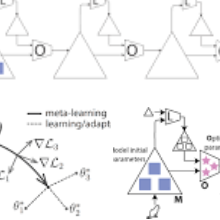Integrating knowledge across different domains is an essential feature of human learning. Learning paradigms such as transfer learning, meta learning, and multi-task learning reflect the human learning process by exploiting the prior knowledge for new tasks, encouraging faster learning and good generalization for new tasks. This article gives a detailed view of these learning paradigms and their comparative analysis. The weakness of one learning algorithm turns out to be a strength of another, and thus merging them is a prevalent trait in the literature. There are numerous research papers that focus on each of these learning paradigms separately and provide a comprehensive overview of them. However, this article provides a review of research studies that combine (two of) these learning algorithms. This survey describes how these techniques are combined to solve problems in many different fields of study, including computer vision, natural language processing, hyperspectral imaging, and many more, in supervised setting only. As a result, the global generic learning network an amalgamation of meta learning, transfer learning, and multi-task learning is introduced here, along with some open research questions and future research directions in the multi-task setting.
翻译:暂无翻译




